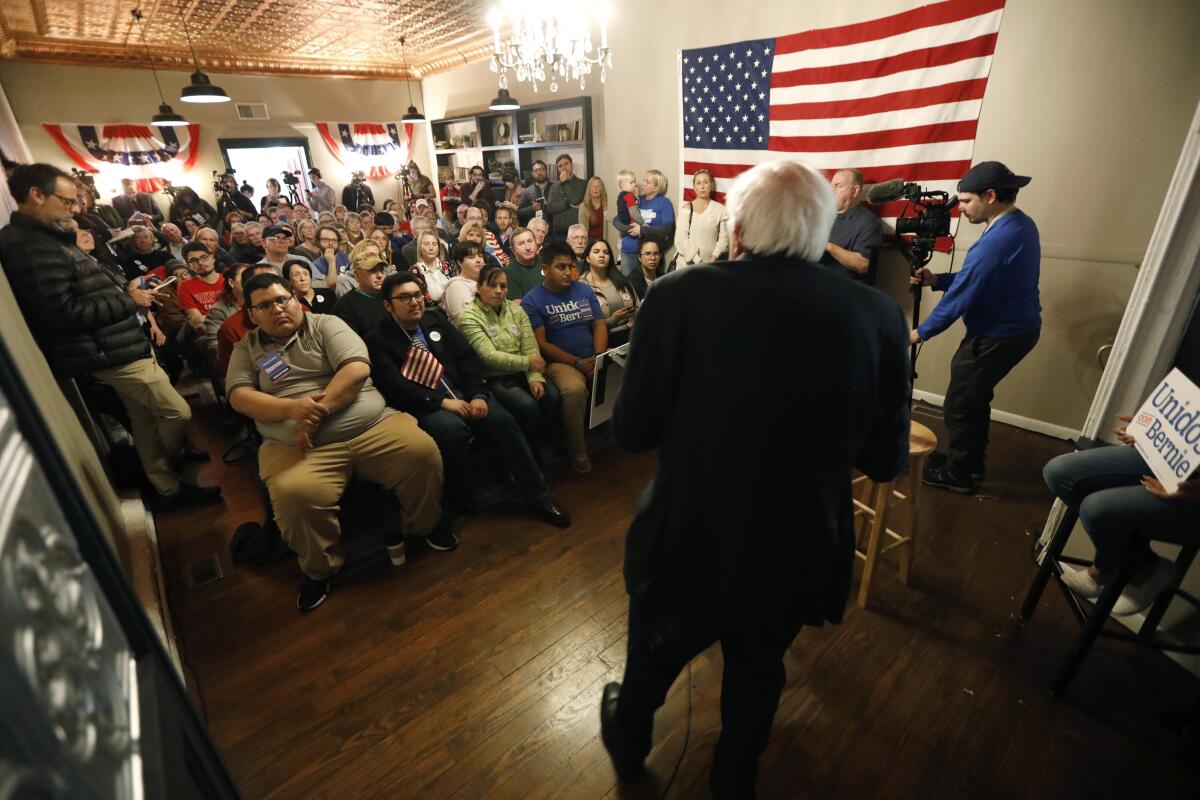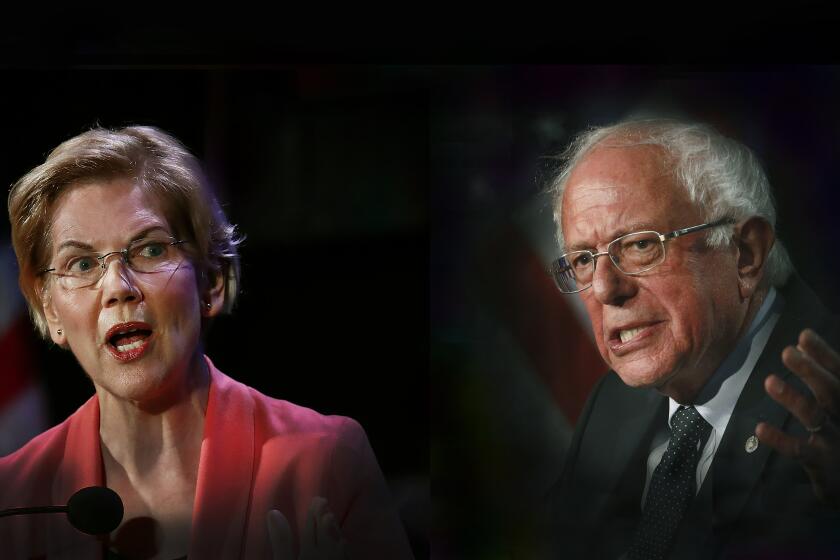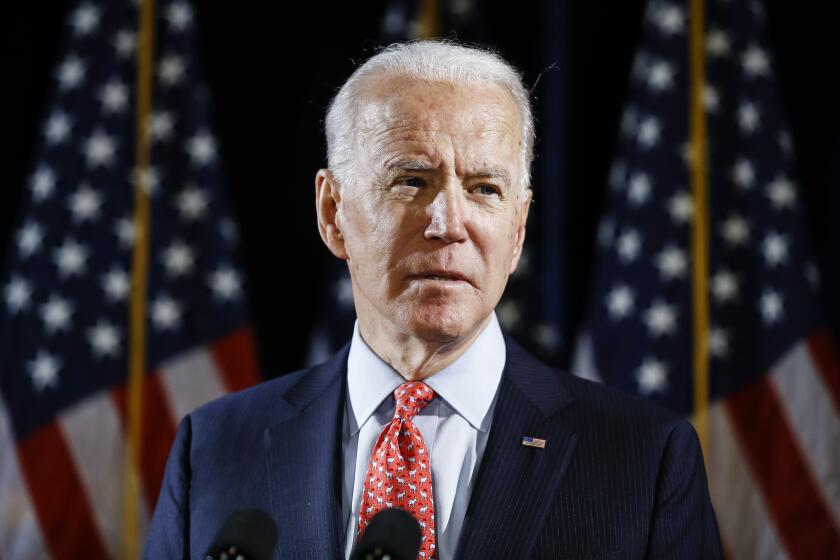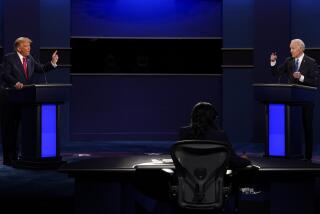Tight polls, impeachment, billionaire wild cards: Uncertainty reigns in the 2020 Democratic race

- Share via
WASHINGTON — As Democrats’ top presidential candidates prepare to meet for the last debate before voters start weighing in, the primary contest remains one of the most unpredictable in decades — a contest not likely to end anytime soon.
In the absence of a commanding front-runner, and with a plethora of well-funded candidates in the top tier, party activists say they have less certainty about the outcome than at any time since 1992, when Bill Clinton ultimately won in a crowded field.
“I can’t remember a time when I had this many questions before the first votes,” said Rebecca Katz, a Democratic strategist who worked on John Edwards’ 2004 presidential campaign. “Things could play out 100 different ways.”
Tensions are rising among the candidates — even among ideological allies — who are increasingly taking shots at each other as the first round of voting nears. On Monday, for example, Sens. Elizabeth Warren and Bernie Sanders quarreled over whether Sanders had told her a woman could not win the presidential election.
The sources of uncertainty are legion: Polls in Iowa and New Hampshire, the first two states to vote, show four candidates bunched closely at the top — former Vice President Joe Biden, former Mayor Pete Buttigieg of South Bend, Ind., as well as Sanders of Vermont and Warren of Massachusetts. Even at this late date, more than half of Iowa Democrats are not certain whom they will back.
Two billionaire candidates are wild cards: Environmentalist Tom Steyer last week unexpectedly seized a place on the Iowa debate stage by doing well in polls in South Carolina and Nevada, which vote in mid- and late-February and where most other candidates were not running television ads.
Former New York Mayor Michael R. Bloomberg is spending sums unmatchable by other candidates to advertise in states, including California, that vote in the March 3 multi-state primary known as Super Tuesday.
And President Trump’s impeachment trial in the Senate is a logistical headache for senators still in the race. The trial may keep them in Washington during the last two weeks before the Feb. 3 Iowa caucuses, a crucial time for candidates to make their closing arguments in a state that prizes retail politics.
The stakes are high because the candidate who comes out on top in Iowa — even by a tiny margin — goes into subsequent primaries, starting with New Hampshire’s on Feb. 11, with a gust of wind at his or her back.
“In the Olympics and presidential caucuses, the track looks crowded when they are running; but in the end, there will be a gold, a silver and a bronze,” said Michael Meehan, who advised Sen. John Kerry during his 2004 presidential campaign. “Those are the people who will get a huge, bright spotlight.”
Against this backdrop, six candidates will appear together onstage Tuesday for the last debate before the Iowa caucuses. Biden, Buttigieg, Sanders, Steyer and Warren will be joined by Sen. Amy Klobuchar of Minnesota, who sees the voting in Iowa, her neighboring state, as her best and probably last chance to vault into the upper tier. Sen. Cory Booker of New Jersey failed to qualify for the second debate in a row, and Monday announced he was ending his campaign.
Since the candidates’ last debate, in Los Angeles in December, the House has impeached Trump, and the U.S. killing of a top Iranian general followed by Iranian missile attacks on U.S. forces in Iraq has shifted attention sharply from domestic to foreign affairs.
That could propel foreign policy to the forefront of Tuesday’s debate, a shift of focus welcomed by Biden, who considers foreign policy his strong suit and is spotlighting it in Iowa.
“We live in the most dangerous moment in a generation,” says the voice-over in a Biden ad in Iowa, which the campaign has updated to include references to the latest Iran news.
“This is a moment that requires strong, steady, stable leadership.”
When is the Democratic debate in Iowa and who are the candidates onstage? Here’s what you need to know, including how to watch.
Sanders comes into the Iowa debate on a roll. He lost Iowa by a whisker to Hillary Clinton in 2016 and believes he can win it this time. He may bring to the stage an intensifying effort to challenge Biden’s arguments that he is the safest choice to beat Trump and has the strongest foreign policy record.
Sanders has repeatedly attacked Biden’s vote 17 years ago to give President George W. Bush authority for the Iraq war. Democrats need a nominee with bold ideas who can inspire the energy and excitement it will take to win the general election, he says, in a critique aimed at Biden.
Nina Turner, Sanders national campaign co-chairwoman, Sunday also published an op-ed in a South Carolina newspaper arguing that Sanders has a stronger record promoting racial justice than Biden, going after the support from African American voters that has been a core strength for the former vice president.
Warren, who is looking for a campaign comeback after a fall slump, has been trying to make a new case for her candidacy: In a field polarized between Biden and Sanders, she could be a consensus candidate, her campaign says, noting that she is to the left of Biden, but has a stronger connection to the party establishment than Sanders.
“More than any other candidate that’s going to be on that debate stage in a few days, Elizabeth Warren is the candidate who can unite the entire Democratic Party,” former rival Julián Castro said when he endorsed Warren last week.
“She can bring people together. She can appeal to all sides.”
On Sunday, Warren made her unity pitch even as tensions rose over a report by Politico that the Sanders campaign had drafted a script for volunteers criticizing Warren for appealing mainly to upscale voters, not broadening the party’s appeal — an unusual break in the cordial relations between the two progressive candidates.
“We all saw the impact of the factionalism in 2016, and we can’t have a repeat of that,” she told reporters in Iowa, referring to the bitter primary fight between Sanders and Hillary Clinton. “Democrats need to unite our party and that means pulling in all parts of the Democratic coalition.”
The tensions between the two progressives heightened Monday when CNN reported that, at a meeting between the two senators in 2018 as they both prepared to run for president, Sanders told her that a woman can’t win. Sanders, in a statement to CNN, denied the report and called it “ludicrous.” Warren late Monday issued a statement saying the two had disagreed about whether a female nominee would win.
Debate stakes are high for Buttigieg because he has invested so much in making his mark in Iowa and New Hampshire. He told supporters it was a “make-or-break moment” in the wake of recent polls.
“It’s a dead heat in both Iowa and New Hampshire — two states where we have to do well in order to continue this campaign,” he said in a recent fundraising email.
The stakes are even higher for Klobuchar. She will have to overperform her single-digit showing in polls to come away from Iowa with any delegates.
That could give her an incentive to again go on the attack against her rivals in the debate — against Buttigieg for being too young and inexperienced; Biden for being a man of another era; Warren and Sanders for being too far left.
That strategy is a double-edged sword. After the December debate, it brought an infusion of donations and attention, but it has yet to deliver the committed support she needs to be viable in Iowa or beyond.
A key audience for the nationally televised debate will be local: the many Iowa Democrats who have not firmly made up their minds.
The Iowa Poll by the Des Moines Register and CNN released Friday found that some 60% of likely caucusgoers were undecided or only lightly committed to their preferred candidate. Sanders came in first as the choice of 20% of likely caucusgoers, followed by Warren, Buttigieg and Biden, but the gap between first and fourth was smaller than the survey’s margin of error, meaning the poll can’t say who is truly on top.
Compared with the last Iowa Poll in mid-November, support for Sanders had risen, Buttigieg dropped, while Biden and Warren remained stable. The Iowa Poll lead has been a trophy that has been passed around among the top four: The No. 1 candidate in the previous three polls were Biden, Warren and Buttigieg.
The poll suggested that Sanders’ supporters were the most committed. But Sean Bagniewski, chairman of the Polk County Democrats, said the question for Sanders is whether his 20% showing is his floor or ceiling.
Whether “Iowans who are still making up their minds will consider him or not” will make the difference, he said.
Monmouth University on Monday released its own poll of Iowa Democrats that showed the same four candidates bunched at the top, but in a different order: Biden came in first with 24%, followed by Sanders with 18%, Buttigieg at 17%, and Warren at 15%.
The field is down to Joe Biden now that Bernie Sanders ended his presidential campaign. Here is the Democrat heading for a battle with President Trump.
The crowded top tier of candidates are all coming off a robust fundraising quarter that has equipped them with the resources to stay in the race well beyond Iowa.
Sanders consistently leads his rivals in raising money even as he refuses to hold private fundraisers and forsakes contributions from wealthy donors. The Vermont senator posted an impressive $34.5-million fundraising haul in the reporting period that ended Dec. 31.
But his rivals have plenty of cash. Biden rebounded from anemic fundraising earlier in the campaign to bring in $22.7 million in the last quarter. Buttigieg topped him with $24.7 million, and Warren, who like Sanders eschews private fundraising events, drew $21.2 million.
Bloomberg and Steyer are testing what bottomless personal wealth can buy in politics. The eye-popping $153 million Bloomberg has spent on television advertising dwarfs the $30 million Sanders, Buttigieg, Warren and Biden have spent combined, according to figures compiled by CNN.
Bloomberg is betting that if there is no clear front-runner out of the first four states, his investment in Super Tuesday states such as California, Texas and Virginia will pay off. But he has also said that he will continue to invest his own money — running anti-Trump ads and paying staff salaries — into the fall even if he does not win the Democratic nomination.
“I am running to defeat Donald Trump,” he said at a Friday rally in Atlanta.
Times staff writer Evan Halper in Washington contributed to this report.
More to Read
Get the L.A. Times Politics newsletter
Deeply reported insights into legislation, politics and policy from Sacramento, Washington and beyond. In your inbox twice per week.
You may occasionally receive promotional content from the Los Angeles Times.











